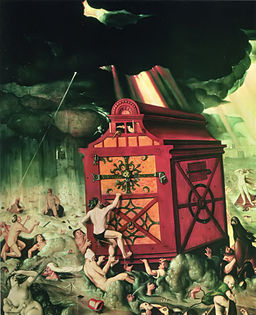Am Donnerstag, 20. Oktober 2016, steht wieder ein Doppelkolloquium im Rahmen des Herzog-Ernst-Stipendienprogramms und des Seminars “Mappings: Raum- und neue Kartographiegeschichte” auf dem Programm des Forschungszentrums: Adam Dunn (St Andrews, Großbritannien) spricht um 14:00 Uhr (c.t.) über „From words to numbers and maps. Transfers, networks and the transformations of statistical thinking in Britain, France and the German lands, c. 1780s-1840s“ und um 17:00 Uhr (s.t.) Sky Michael Johnston (San Diego/USA) zum Thema „A Century of Weather in Thuringia, 1512–1613“.
Interessierte Zuhörer sind herzlich willkommen. Beide Vorträge werden in englischer Sprache gehalten und finden im Seminarraum des Forschungszentrums („Pagenhaus“) auf Schloss Friedenstein statt. Hier kurze Einführungen:
Adam Dunn (St Andrews, Großbritannien): From words to numbers and maps. Transfers, networks and the transformations of statistical thinking in Britain, France and the German lands, c. 1780s-1840s
The aim of the project is to map the changes in the perception, methodology and use of statistics from the late 18th to the early 19th century. It seeks to establish how the concept of statistics shifted from a more descriptive series of statistical accounts to the more mathematically driven model of statistics prevalent in the 19th century, finally, leading to the introduction of statistical maps in the mid 19th century. The paper will approach the subject from a transnational perspective that seeks to follow individuals in an attempt to reconstruct connections and networks across borders linking the later Enlightenment to the first decades of the 19th century. With this in mind the aim of this paper is to present the case of Sir John Sinclair, as well as some of the preliminary findings made in Gotha, to illustrate the development of such networks and how they influence the changes in statistical thought.
Adam Dunn is a PhD candidate at the University of St Andrews entering into his second year of study. His research focuses on the development of statistical thought and the social and political sciences during the late 18th and early 19th century.
Sky Michael Johnston (San Diego, USA): A Century of Weather in Thuringia, 1512–1613
Sky Michael Johnston’s research project examines perceptions of the weather as a means of investigating cultural ideas across early modern German-speaking lands. As a whole, it examines ideas about weather in a range of contexts. His talk focuses on accounts of and reactions to actual weather events in the region of Thuringia in the 16th and early 17th centuries. The study begins and ends with notable weather events, culminating in the well documented 1613 Thüringer Sintflut. Sermons, a chronicle, and other contemporary printed accounts of the weather during these 101 years comprise the source base for this talk. These records reveal early modern European notions of God’s relationship to humans, the mechanisms of the natural world, and the possibilities for the wondrous. In this context weather takes on a significance that is both fascinating and revelatory of the world in which it occurred.
Sky Michael Johnston is a doctoral candidate in the Department of History at the University of California, San Diego. In the upcoming months he will carry out further research in Tübingen and Wolfenbüttel.
Abbildung: Hans Baldung Grien (1485–1545), Die Sintflut, 1516, Bayerische Staatsgalerie, Zweiggalerie Neue Residenz Bamberg, via Wikimedia Commons

